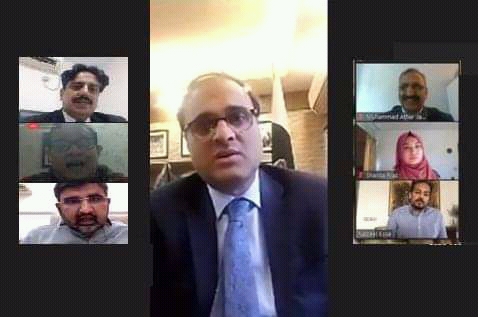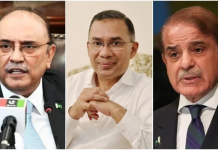Islamabad; 05 July 2021 – Pakistan’s High Commissioner to Bangladesh Imran Ahmed Siddiqui has said that many Pakistani businesses have invested in Bangladesh and many Pakistani professionals contributed to the development of Bangladesh particularly its garment sector. There are certain dormant consultative mechanisms at the government level which need to be revived as soon as possible such as Joint Economic Commission.
He was speaking in a webinar on “Pakistan – Bangladesh Economic Relations: Future of Cooperation” hosted by Islamabad based think tank Pakistan House.
The High Commissioner said “The platform of Joint Economic Commission remained inactive for many years, however governments on both sides have agreed, in principle, to restart the process. This is important for addressing the hurdles that businessmen and exporters face in enhancing their businesses. Bangladesh is among the top 10 exporting destinations of Pakistani products, which include cotton, yarn, fabric, leather, inorganic chemicals, vegetables and electronics. There is a need to promote better and more frequent interaction between the private sectors of the two countries to enhance trade which is mutually beneficial.”
“Bangladesh economy is at a stage where the businesses can move out and invest in other countries. Bangladeshi businesses may explore opportunities being offered by CPEC which can also be used as a transport link if Bangladesh is sourcing its imports from Western and Central China. Let us work on creating Pakistan-Bangladesh Business Council for stronger relations. Bilateral relations even between the two closest countries are not always friction free. There may be some problems too. But fortunately the leadership is committed to moving ahead and to promoting better relations.
Ms. Shaista Riaz, Research Associate of Pakistan House moderated the webinar. She highlighted that both countries have decided to finalize a bilateral Free Trade Agreement. FTA will pave the way for opening trade opportunities.
Mr. Manzur Rashid, Business Director of ACI Chemicals Limited Dhaka, said that we have found great fabric and yarn manufacturers from Pakistan. CPEC holds great importance and this opportunity will bring prosperity to Bangladesh as well because 30%-40% of the import is coming from China. Using CPEC as a channel, Pakistan should promote it to Bangladeshi businessmen.
Engr. Ihtesham Javaid, President Faisalabad Chamber of Commerce and Industry remarked that Bangladeshi investors should come to Pakistan and invest by establishing industries. New routes are available now for Bangladesh to reach Pakistan, such as through China. In 2020, the volume of bilateral trade was $644 million, which was very little considering the market and opportunities. The good news is that the volume of trade has increased significantly in 2021.
Mr. Nabeel Essa, Director Tasho Enterprises Limited Dhaka mentioned that other than just yarn and fabric, we need to focus on other aspects of building communication as well including promoting Bangladeshi artisans, brands, MNCs and business stakeholders. 65% of the Bangladeshi population is involved in Agriculture. Bangladesh has the potential to enhance and promote agriculture outside the State too with the help of Pakistan.
Mr. Sadrul Hassan, Special Correspondent UNB, Dhaka, BD said that Pakistan and Bangladesh have huge potential that remains untapped due to many problems. Bangladeshi businessman faces the absence of a direct shipping line to Pakistan and other tariff and non-tariff barriers.Leadership from both countries need to establish direct and regular contact. Both need to work on the sector of tourism, such as launching joint ventures and secondly, they need to work on the textile sector.
Mr. Suleman Khan, the Commercial Counselor, Embassy of Pakistan, Dhaka, highlighted that South Asian Free Trade Area (SAFTA) is an agreement reached on January 6, 2004, at the 12th SAARC summit in Islamabad. It created a free-trade area of 1.6 billion people in Afghanistan, Bangladesh, Bhutan, India, the Maldives, Nepal, Pakistan, and Sri Lanka to reduce custom duties of not all traded goods but selected items to zero by the year 2016. Pakistan and Bangladesh both get the advantage from SAFTA.
Pakistani exports to Bangladesh were US$583.44 Million during 2020, according to the United Nations COMTRADE database on international trade. Bangladesh is the overall top tenth export market of Pakistani products. Fabrics, cotton, plastic, leather, fruits, dates are the products exported to Bangladesh. Jute, medicines are many other products imported by the Pakistani market. Some issues need to be addressed that there should be a simple visa procedure, there are no direct shipping lines and no direct flights. Business is affected because of no direct connection, this causes late consignment, and hurdles for importers and exporters.
While concluding the Webinar, Mr. Muhammad AtharJaved, DG Pakistan House said that It is important to understand that both countries can help each other and grow each other’s economies. Both have the potential to work together but we need to have an open dialogue with public and private partners.

















